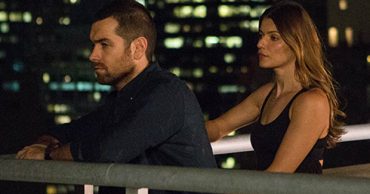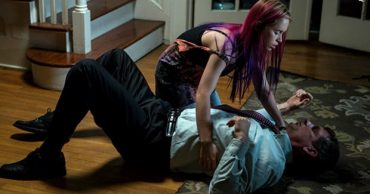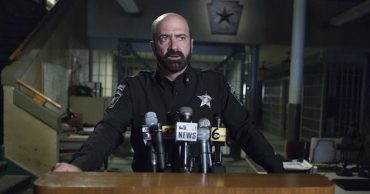
Last week, I noted Banshee‘s ambitions to dig into its setting further, leading to one of the show’s most intriguing hours. “Bloodlines” has lofty goals of its own, achieving a thematic unity I can’t remember the show even attempting to do on this level before. It’s really a clever little slight of hand: Banshee still wants to entertain us with blood, hot women and lots of knuckle-busting – but underneath that, the sophomore season of Banshee is about the search for identity, a violent portrayal of the mental and emotional struggle between what we think we know about ourselves, and what our actions ultimately say to the world.
This idea of identity all begins with our titular character: there’s been a lot of pointed criticism at Lucas Hood and his ability to police the town of Banshee. Of course, this is because Lucas is not a cop; but it’s also because Lucas is not Lucas. He’s The Man with No Name, the cowboy wandering through the lonesome darkness struggling to figure out who he is. Part of him still thinks he’s the hardened criminal who pulled off major heists and beat up anybody he wanted to, though “Bloodlines” continues to show what a failure he is to the Banshee Police Department, unable to transport one prisoner, keep another alive, and respect the laws and traditions involved with entering the local Kanaho reservation. Another part of Lucas actually thinks he could be police, albeit an unorthodox one who’ll spend most of his evenings wiping blood of his paperwork from the still-fresh cuts on his face (boy, that gash on his temple is a doozy of a sight throughout this episode).
But Lucas is neither of these things: he’s not the criminal he once was (his inability to pull off a neat heist in both seasons proves this), and he’s also not the uninhibited lawman he wants people to think he is. He’s a lost soul, a person who’s defined his entire life by his job and the love of one woman, and that internal dissonance is what has him losing sleep at night. Like Job’s pointed out so poignantly through both seasons, Ana is not Ana anymore: so what is Lucas still doing in Banshee, PA? He’s there because of who he once was – and although he’d clearly do anything to live that life again, he’s unable to recognize that 15 years in prison has turned him into a much colder person separated from his feelings: in fact, the only feeling he seems to have left is anger.
This internal struggle for self-definition isn’t contained to Lucas, however: everything from Ana’s dream sequence that opens the episode, to Jason Hood’s (probably ill-fated) journey to adopt a new identity speaks to the nature of the show’s characters, and their inability to reconcile their self-image with the image of others. Kai’s proclamations of “saving” his family once again show his desperation for acceptance, his well-scripted dialogue revealing the hypocrisy behind Kai’s claims of self-import, pointing out just how insecure the most confident man in Banshee really is when it comes to his family.
By the same token, Alex Longshadow’s crisis of identity comes down to the views of his “family” (his sister Nola and the Kanacho board) and his views of himself as part of the warrior class, the ‘Thunder Man” who can go toe-to-toe with Kai both intellectually and physically (as shown in a short, kinetic little exchange of blows with Kai in the diner). Is he that man? He finally takes a step in the right direction (or so he hopes) by dismissing Nola, a loose cannon whose ‘vision’ of her brother and their shared mission was a little more than off-base.
On a more macro level, “Bloodlines” digs into the town of Banshee itself, and how the different ethnic groups view themselves. Kai hurling insults at his Amish kinfolk not only speaks to his own insecurities and feelings of rejection: it points out the hypocritical nature of their supposed “faith”, bowing to a God that would not only allow the torture of their nephew by a fellow village member, but kill his girlfriend and allow their abomination of a ‘son’ return home to extract (literally) some violent vengeance on Daniel Moses. Some may view it as a direct attack on organized religion, but it takes the very specific form of Kai’s family and their views of each other, moving away from the philosophic discussion of good versus evil, becoming instead a pointed criticism of the characters and the supposed “beliefs” they all subscribe to.
Of course, having a character like Chayton around makes a lot of these thematic connections loud and obvious (as did Siobahn’s personal ‘journey’ in “The Thunder Man”): his comments about characters like Emmet are based in racial and historical facts, but still speak to the show’s narrative focus on just about every level: Banshee‘s second season is about the violent consequences of being dishonest with oneself, how a foundation of lies falls apart once someone is exposed for who they really are (does anyone else view Ana’s time in prison as a purgatory of sorts? The opening dream sequence certainly suggests she won’t be “free” until she decides who she really is, the thirty days in prison less of sentence, and Ana’s final opportunity to redeem herself and embrace the truth, once and for all. As Rabbit so poignantly points out in the closing scene, insanity and the truth are not very far apart: and if one is unable to embrace the latter, the former is bound to take over. Insanity is defined as doing the same action over and over expecting different results- and if there’s anything that describes the merry, misguided band of Banshee characters, it’s that very phrase, a group of square people attempting to fit in the circular holes they think they fit into.
Other thoughts/observations:
– fellow TVOvermind and Sound on Sight contributor Sean Colletti wrote a great (and lengthy) piece about what makes Banshee such an addicting show: check it out here.
– I didn’t really care for the character of Daniel Moses, the first example of Banshee allowing its personification of religious society to fall in the convenient trap of “murderous righteousness”, something more akin to an episode of Law and Order: Totally Predictable than something like Banshee’s exploration of its titular setting, which attempts for a bit more nuance and moral ambiguity.
– Chayton: “what is with white people and chains?”
– another beautiful bit of hypocrisy: Kai points out to Alex that it takes more strength to make peace than to fight, right before he drops a pile of Daniel’s teeth on his desk.
– “Bloodlines” drops the ball a bit with Rebecca, who indulges Jason’s advances for the sake of emotional release. Yawn.
– boy, does Ben Cross know how to dominate a scene. I hate how they did it, but I can’t complain that Banshee is keeping its finest performer around for another season.
– the single funniest joke of “Bloodlines”? Job’s corset and sunglasses.
– Nola, getting right to the point: “be the f****ing shark, Alex.”
[Photo via Cinemax]
 Follow Us
Follow Us





